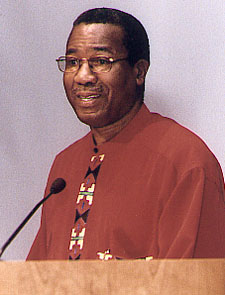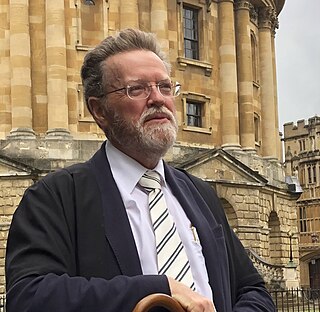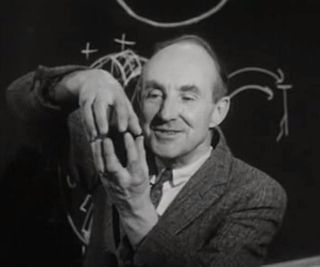Related Research Articles

Antony Hewish was a British radio astronomer who won the Nobel Prize for Physics in 1974 for his role in the discovery of pulsars. He was also awarded the Eddington Medal of the Royal Astronomical Society in 1969.

Robert McCredie May, Baron May of Oxford, HonFAIB was an Australian scientist who was Chief Scientific Adviser to the UK Government, President of the Royal Society, and a professor at the University of Sydney and Princeton University. He held joint professorships at the University of Oxford and Imperial College London. He was also a crossbench member of the House of Lords from 2001 until his retirement in 2017.
Sir Alan Geoffrey Wilson is a British mathematician and social scientist, former Vice-Chancellor of the University of Leeds and a professor at University College London.

Philip Harris Ltd was a British laboratory supply company which became a major supplier of equipment for school science. The brand name is now owned by Findel plc.
Michael Ellis Fisher was an English physicist, as well as chemist and mathematician, known for his many seminal contributions to statistical physics, including but not restricted to the theory of phase transitions and critical phenomena. He was the Horace White Professor of Chemistry, Physics, and Mathematics at Cornell University. Later he moved to the University of Maryland College of Computer, Mathematical, and Natural Sciences, where he was University System of Maryland Regents Professor, a Distinguished University Professor and Distinguished Scholar-Teacher.

Malegapuru William Makgoba is a leading South African immunologist, physician, public health advocate, academic and former vice-chancellor of the University of KwaZulu-Natal. In 2013 he was recognised as "a pioneer in higher education transformation", by being awarded the Order of Mapungubwe in Silver.
Brian Hilton Flowers, Baron Flowers FRS was a British physicist, academician, and public servant.

Sir Keith Burnett, CBE, FRS FLSW FINSTP is a British physicist and President Elect of the Institute of Physics. He is Chair of the Nuffield Foundation — an independent charitable trust with a mission to advance educational opportunity and social well-being, founding Chair of the Academic Council the Schmidt Science Fellows, and a member of the Board of international education providers Study Group.

Eric M. Rogers was a British writer and physics educator. He is perhaps best known for his 1960 textbook Physics for the Inquiring Mind. The book, subtitled The Methods, Nature, and Philosophy of Physical Science, was based on courses he gave at Princeton University, where he taught from 1942 to 1971. Rogers also headed the Nuffield Science Teaching Project programme in physics education in the 1960s.
Clifford Victor Johnson is a British theoretical physicist and professor at the University of California, Santa Barbara department of Physics.

Sir Colin John Humphreys is a British physicist and a hobbyist Bible scholar. He is the Professor of Materials Science at Queen Mary University of London.

Sir Clifford Charles Butler FRS was an English physicist, best known for the discovery of the hyperon and meson types of particles. In later life, Butler was involved in educational policy, serving as director of the Nuffield Foundation and vice-chancellor of Loughborough University.

The UCL Great Ormond Street Institute of Child Health (ICH) is an academic department of the Faculty of Population Health Sciences of University College London (UCL) and is located in London, United Kingdom. It was founded in 1946 and together with its clinical partner Great Ormond Street Hospital (GOSH), forms the largest concentration of children's health research in Europe. In 1996 the Institute merged with University College London. Current research focusses on broad biomedical topics within child health, ranging from developmental biology, to genetics, to immunology and epidemiology.
Fellowship of the Institute of Physics (FInstP) is "the highest level of membership attainable" by physicists who are members of the Institute of Physics (IoP), "for those with a degree in physics or related subject and who have made a significant impact on their sector"; it is for "distinguished physicists in recognition of their accomplishments".
The Nuffield Science Teaching Project was a programme to develop a better approach to teaching science in British secondary schools, under the auspices of the Nuffield Foundation. Although not intended as a curriculum, it gave rise to alternative national examinations, and its use of discovery learning was influential in the 1960s and 1970s.
Muthusamy Lakshmanan is an Indian theoretical physicist currently working as Professor of Eminence at the Department of Nonlinear Dynamics of Bharathidasan University. Presently he is the DST-SERB National Science Chair awarded by the Science and Engineering Research Board, Department of Science and Technology. He has held several research fellowships which included Raja Ramanna fellowship of the Department of Atomic Energy, Alexander von Humboldt fellowship, Japan Society for the Promotion of Science fellowship, Royal Society Nuffield Foundation fellowship, and NASI-Senior Scientist Platinum Jubilee Fellowship. On 15 August 2021, he was conferred with the Dr. A. P. J Abdul Kalam Award by the Government of Tamil Nadu.
Anna Frances Vignoles is a British educationalist and economist. She is the Director of the Leverhulme Trust, taking up her position in January 2021. Previously, she was Professor of Education and fellow of Jesus College at the University of Cambridge, where her research focused on the economic value of education and issues of equity in education. She was elected as a fellow of the British Academy in 2017.
Sarah Madeleine Thompson MBE is a British physicist. Thompson is associate dean (research) for the Faculty of Science at the University of York. She was head of the Department of Physics at the University of York from 2011 to 2017. She is a fellow of the Institute of Physics and she was Vice President of Institute of Physics until 2019.
Paul J. Black is a British educational researcher, physicist and a current Professor Emeritus at King's College London. Black was previously Professor of Science Education and Director of the Centre for Science and Mathematics Education at the Chelsea College of Science and Technology and Head for Educational Studies at King's College London. He is a former Chair for the Task Group on Assessment and Testing and Deputy Chair of the National Curriculum Council, and is recognised as an architect of the national curriculum testing regime and the national curriculum for Science.
Kevin William Keohane CBE, KCSG, FInstP (1923-1996) was a British physicist and education administrator. Keohane was the first Professor of Science Education in the United Kingdom, holding the position with the Chelsea College of Science and Technology between 1967 and 1976. Keohane was made the first Rector of the newly formed Roehampton Institute of Higher Education in 1976, a position he held until his retirement in 1988.
References
- 1 2 3 4 5 6 7 8 9 10 "Citation for the Presentation of the ICPE Medal to Professor Jon Michael Ogborn of the Institute of Education, University of London Tokyo 2006". International Commission on Physics Education. Retrieved 8 January 2021.
- ↑ "Professor Jon Ogborn, Honorary Fellow". Institute of Physics. Retrieved 8 February 2021.
- ↑ Hertford Mercury Friday 6 March 1953, page 4
- ↑ Hertford Mercury Friday 28 August 1953, page 7
- ↑ "Paul Black and Jon Ogborn, Nuffield Advanced Physics Project". Chilton Computing. Retrieved 5 February 2021.
- ↑ Black, P. J.; Ogborn, Jon (January 1977). "P.J. Black & Jon Ogborn (1977) Inter-university collaboration in methods of teaching science, Studies in Higher Education, 2:2, 149-159, DOI:10.1080/03075077712331376453". Studies in Higher Education. 2 (2): 149–159. doi:10.1080/03075077712331376453 . Retrieved 8 February 2021.
- ↑ Groupe Internationale pour la Recherche sur l'Enseignement de la Physique, Newsletter 47, January 2003
- 1 2 "Jon Ogborn, Osher Fellow, February and March, 1993". Exploratorium. 8 January 2013. Retrieved 8 February 2021.
- ↑ "Energy and Change". STEM Learning. Retrieved 8 February 2021.
- ↑ "Break down the energy barrier". TES. 3 January 1997. Retrieved 8 February 2021.
- ↑ Jon Ogborn, October 2016, Physics Education 51 030107
- ↑ "Lawrence Bragg Medal and Prize recipients". Institute of Physics. Retrieved 8 February 2021.
- ↑ Hertford Mercury Friday 10 April 1953, page 5
- ↑ Surrey Advertiser Friday 31 March 1972, page 17
- ↑ "Joan Bliss Obituary". The Guardian. 8 June 2011. Retrieved 6 February 2021.
- ↑ John Ogborn, Joan Bliss (1977). Students Reactions to Undergraduate Science. Heinemann Educational for Nuffield Foundation Volume 4. ISBN 9780435695835 . Retrieved 8 February 2021.
- ↑ Force and motion from the beginning, December 1994, Learning and Instruction 4(1):7–25 DOI: 10.1016/0959-4752(94)90016-7, doi:10.1016/0959-4752(94)90016-7
- ↑ "Should science courses be context-led". EIC - The Royal Society of Chemistry. 1 March 2008. Retrieved 8 February 2021.